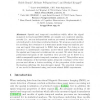Free Online Productivity Tools
i2Speak
i2Symbol
i2OCR
iTex2Img
iWeb2Print
iWeb2Shot
i2Type
iPdf2Split
iPdf2Merge
i2Bopomofo
i2Arabic
i2Style
i2Image
i2PDF
iLatex2Rtf
Sci2ools
115
click to vote
IPMI
2001
Springer
2001
Springer
Spatio-temporal Covariance Model for Medical Images Sequences: Application to Functional MRI Data
Spatial and temporal correlations which affect the signal measured in functional MRI (fMRI) are usually not considered simultaneously (i.e., as non-independent random processes) in statistical methods dedicated to detecting cerebral activation. We propose a new method for modeling the covariance of a stationary spatio-temporal random process and apply this approach to fMRI data analysis. For doing so, we introduce a multivariate regression model which takes simultaneously the spatial and temporal correlations into account. We show that an experimental variogram of the regression error process can be fitted to a valid nonseparable spatio-temporal covariance model. This yields a more robust estimation of the intrinsic spatio-temporal covariance of the error process and allows a better modeling of the properties of the random fluctuations affecting the hemodynamic signal. The practical relevance of our model is illustrated using real event-related fMRI experiments.
Intrinsic Spatio-temporal Covariance | IPMI 2001 | Medical Imaging | Spatio-temporal Covariance Model | Spatio-temporal Random Process |
Related Content
| Added | 16 Nov 2009 |
| Updated | 16 Nov 2009 |
| Type | Conference |
| Year | 2001 |
| Where | IPMI |
| Authors | Frithjof Kruggel, Habib Benali, Mélanie Pélégrini-Issac |
Comments (0)

